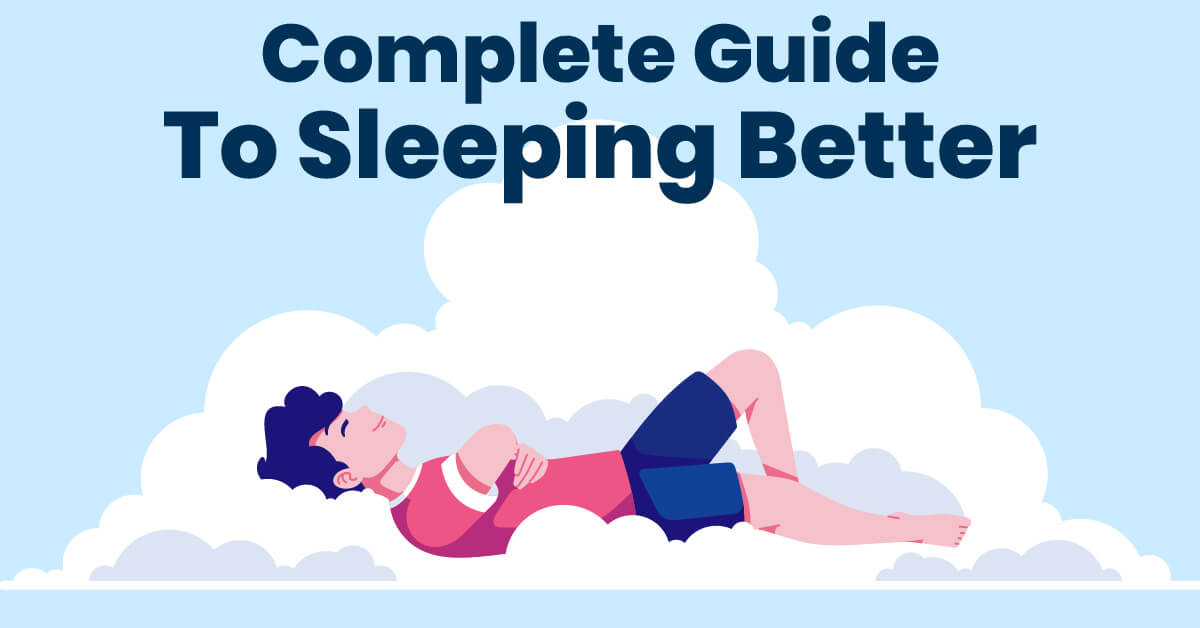As a BetterHelp affiliate, we receive compensation from BetterHelp if you purchase products or services through the links provided
Sleep is an essential part of ensuring our general health and well-being. But when we don’t – or can’t – get a good night’s rest, things can turn sour quickly. Inadequate sleep has been linked to several significant conditions and disorders, including diabetes, heart disease, anxiety, and depression.
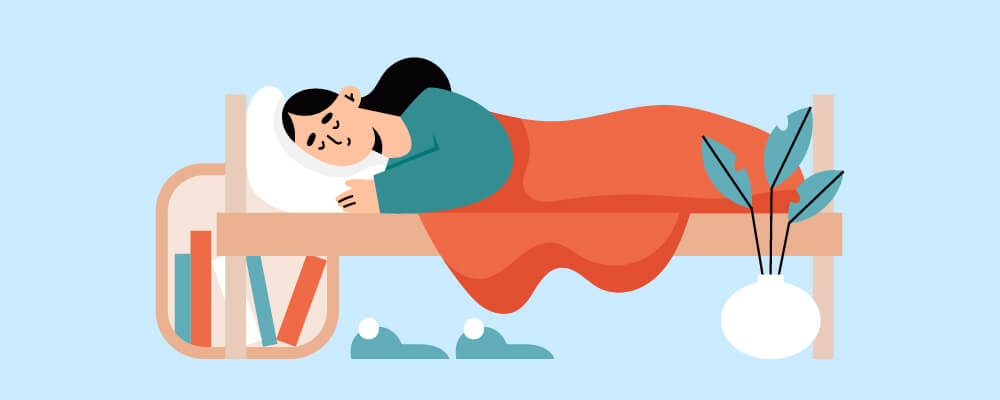
Since you’re here, we will assume that you often wake up feeling tired or groggy and often have little to no sleep.
Not getting a quality night’s rest can be both scary and overwhelming. But you no longer have to suffer in silence!
This complete guide will provide different ways to sleep better to begin enjoying a restful night’s sleep as soon as possible.
- Introduction
- Why Is Sleep So Important?
- How Many Hours Should I Sleep At Night?
- Newborns — 14-17 Hours Daily
- Infants (4-11 Months) — 12-15 Hours Daily
- Toddlers (1-2 Years) — 11-14 Hours Daily
- Preschoolers (3-5 Years) — 10-13 Hours Daily
- School-Age Children (6-13 Years) 9-11 Hours Daily
- Teenagers (14-17 Years) — 8-10 Hours Daily
- Adults (18-64 Years) — 7-9 Hours Daily
- Older Adults (65+ Years) — 7-8 Hours Daily
- Signs of Poor Sleep
- Feel Tired, Irritable, And Fatigued During The Day
- Have Difficulty Focusing Or Remembering Things
- Find It Difficult To Get Out Of Bed In The Morning
- Feel Lethargic Or Drowsy In The Afternoon
- Find It Difficult To Stay Awake In Lectures, Meetings, Warm Rooms, While Driving Or Commuting, Or After A Heavy Meal
- Have To Take A Nap During The Day
- Need To Sleep Late On Weekends
- Having Mood Changes
- Key Steps To Improving Your Sleep
- Summary
Why Is Sleep So Important?
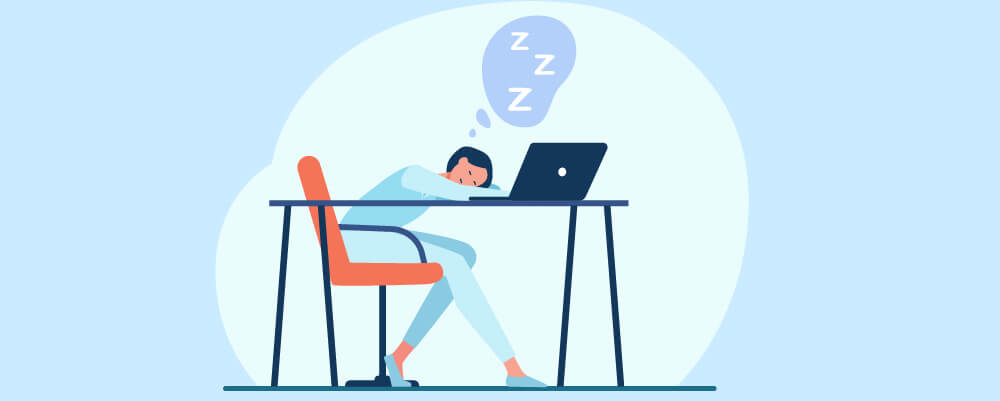
Better Productivity And Concentration
The connection between sleep, productivity, and concentration cannot be ignored. They truly go hand in hand for a fulfilling life. Therefore, the overall value of high-quality sleep in increasing productivity is vital. This point has been proven repeatedly throughout history.
Poor sleep affects memory, decision-making, problem-solving, and alertness which are all fundamental aspects of being productive. So, to summarize: the less rest you have, the more likely you are to procrastinate tasks and be highly unproductive.
Additionally, a sleep-deprived individual cannot focus their attention optimally. Several studies that scientists did in the early 2000s looked at the effects of sleep deprivation.
Their research concludes that sleep has strong links to several essential brain functions, including:
- concentration
- productivity
- cognition
Overall, it’s clear that sleep plays a significant role in memory consolidation. This is essential in terms of concentrating and learning new information.
Lower Weight Gain Risk
Poor sleep can negatively impact all facets of our life, but our weight is one area that we might not realize is being affected. Those who achieve a full night of sleep may be able to moderate their appetite and will feel more refreshed to make better food choices.
Individuals who regularly get less than their daily recommended hours of sleep will face the opposite problem. In addition, they are at a higher risk for diabetes and cognitive decline and may even suffer from a stroke! A lack of sleep can also lead to faster weight gain as it produces higher levels of the stress hormone cortisol.
However, several recent studies demonstrate a lack of connection between being overweight and struggling with sleep deprivation. This research argues that lots of previous studies carried out in this field fail to take other adequate factors into account, including:
- Drinking Alcohol
- Living With Type 2 Diabetes
- Level Of Physical Activity
- Education Levels
- Long Working Hours
- Long Sedentary Time
A lack of sleep may affect a person’s desire or ability to maintain a healthful lifestyle, but it may or may not directly contribute to weight gain.
Better Calorie Regulation
It’s been said that getting enough sleep can help an individual consume fewer calories throughout the day. However, if you don’t sleep for long enough, it can interfere with your body’s ability to regulate food intake correctly.
Particular sleeping patterns can impact the hormones that regulate our appetite – known as ghrelin and leptin. So, having little to no sleep will increase feelings of hunger.
Low amounts of sleep can also compromise our ability to make healthy food choices. Any change to your brain chemistry brought about by insufficient sleep can affect many functions, including impulse control and judgment. This often results in poor food choices.
Short periods of sleep (or no sleep at all) have been shown to activate the brain’s reward centers, which increases the appeal of junk food. In addition, people short on sleep are more likely to consume more calories from carbohydrate-rich snacks.
It’s also important to mention that restricting your calories too much (think starvation-level restriction) could lead to serious sleep interruption. But on the other hand, it could also result in a lack of deep sleep and a low mood, leading to different sleep issues in the long run. So, finding the perfect balance is crucial to getting a better night’s sleep.
Greater Athletic Performance
It may be no surprise that getting a significant amount of sleep can significantly enhance an individual’s athletic performance.
While the average recommended amount of sleep for an adult hovers between 7 and 9 hours each night, athletes may benefit from more fitful rest. Sleep is as essential to an athlete as consuming the proper nutrients and calories!
Having a good night of sleep gives the body time to heal and helps consolidate memories. When athletes take the time to practice or learn a new skill, sleep will help them memorize the information. This will contribute to improved performance in the future.
Other benefits include:
- Better Performance Intensity
- Higher Energy Levels
- Improved Coordination
- Faster Speed
- Greater Mental Functioning
Lower Risk of Heart Disease
Sleep is a crucial part of maintaining an overall healthy lifestyle. As a result, you feel more well-rested, are in control of your actions and emotions, and will likely feel more positive about your life.
However, one other point is an exceedingly important part of staying healthy: higher rates of sleep will decrease the risk of heart disease.
One of the significant risk factors of heart disease happens to be high blood pressure. However, if you get adequate rest each night, your body’s blood pressure will be able to regulate itself.
It’s been revealed that adults with healthy sleep patterns have a 42% lower risk of heart failure than those with an unhealthy sleep routine – regardless of other risk factors.
Doing so can reduce the chances of sleep-related conditions such as sleep apnea and will also work to promote better overall heart health.
To summarize: the more quality sleep you get, the healthier your heart will be!
Preventing Depression And Improving Mental Health Conditions
The link between sleep and mental health has been the main research subject. A lack of sleep has been closely examined as a contributing factor to depression. Sleep problems are often the first sign of depression.
And the two are so closely tied that it can be hard to tease them apart. If you have suffered through too many nights of poor sleep, you may be more vulnerable to struggling with bouts of depression. Or you might be sleeping poorly because you’re depressed.
Getting a good night’s sleep can be an essential part of your plan to manage depression. When you’re well-rested, you’ll have more energy, and you may also have a more positive view of life and better focus.
If you want to improve your mental health conditions, getting enough fitful rest is the first thing you need to do.
Lower Inflammation
There is a solid link between reducing inflammation in the body by getting adequate sleep. This is because blood vessels relax while in dreamland, meaning your blood pressure drops.
If you work from a restricted sleep schedule, your blood pressure won’t decline. This could trigger the cells in the walls of blood vessels that activate inflammation.
Another way inflammation can impact your rest time is through sleep cycles. Individuals with higher levels of inflammation will suffer from a lack of deep sleep and will likely spend less time in REM sleep. This is not ideal – mainly because REM sleep plays an extremely vital role in many of your body’s functions.
This type of restorative sleep is also critical for encoding new memories into long-term memories.
Stronger Immune System
Sleep helps the body repair, regenerate, and recover. The immune system is no exception to this relationship. In addition, some research shows how better sleep quality can help the body fight off infection.
As we sleep, the body produces cytokines. This is a protein that targets inflammation and infection. During the nighttime, our bodies also produce T-cells. These white blood cells play a critical role in our body’s immune response to an infectious disease. Thanks to these processes, our bodies can create a significant immune response.
However, scientists still need to research the exact mechanisms of sleep regarding its impact on the body’s immune system.
How Many Hours Should I Sleep At Night?
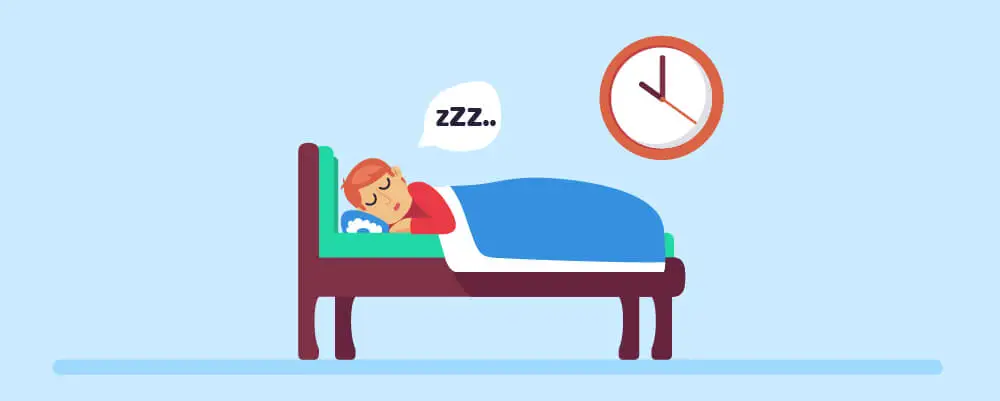
All recommended sleep times are broken down into a few age groups. The generic guidelines present recommended ranges of nightly sleep duration for relatively healthy individuals in each age group. In some cases, sleeping an hour more or less than the general range may be acceptable – but this is entirely based on a person’s circumstances.
Here are recommendations based on age:
Newborns — 14-17 Hours Daily
Newborn babies tend to sleep anywhere from two to four hours. They are lighter sleepers than the typical adult and will likely wake up very quickly throughout the day to feed.
Infants (4-11 Months) — 12-15 Hours Daily
Infants should get this sleep throughout the 24 hours, rather than at nighttime. This is a period of significant growth, and babies will spend as much time as possible sleeping to supplement it.
Toddlers (1-2 Years) — 11-14 Hours Daily
That time should be split between 10-12 hours of sleep at night and around 1-2 hours of sleep during the day. A toddler’s common sleep problems may include not wanting to stay in bed at bedtime and may involve having trouble settling down enough to fall asleep.
Preschoolers (3-5 Years) — 10-13 Hours Daily
The total amount of sleep that preschoolers get should include naps. The key to meeting this need is setting regular wake-up times, bedtimes, nap times, or even some dedicated quiet time during the day.
School-Age Children (6-13 Years) 9-11 Hours Daily
Not getting adequate sleep is common amongst individuals in this age group. This is largely thanks to more school obligations – such as homework – evening activities, and then having a later bedtime.
Teenagers (14-17 Years) — 8-10 Hours Daily
The body’s circadian rhythm resets during the teenage years. As a result, it may force an individual to fall asleep later and wake up later. So it may be no surprise that teenagers require more sleep than average adults.
Adults (18-64 Years) — 7-9 Hours Daily
Having this amount of sleep each day will allow your body and mind to recharge, helping you feel more alert and refreshed when you wake up and face the world.
Older Adults (65+ Years) — 7-8 Hours Daily
Many older people have more trouble falling asleep at night than the average adult. This is a big reason many older individuals may take a short nap during the day – to replenish their energy.
Signs of Poor Sleep
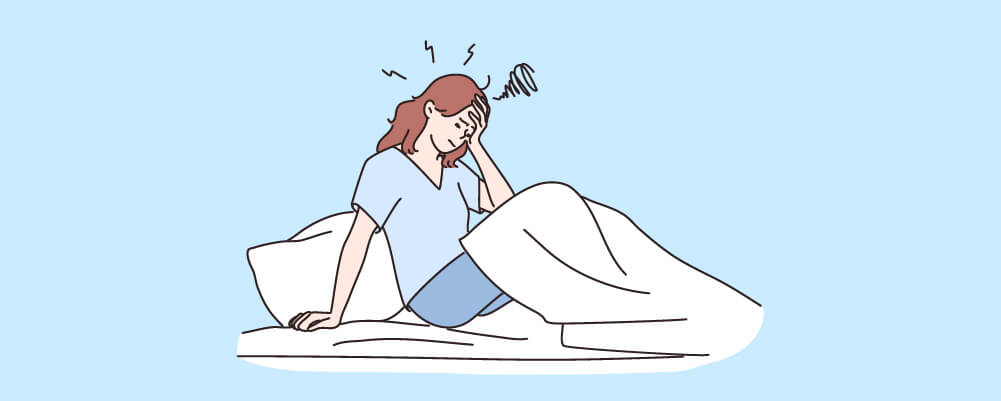
Feel Tired, Irritable, And Fatigued During The Day
The amount of sleep you get and your mood are very closely connected. Therefore, a short or restless sleep could cause discomfort and irritation, which adds unnecessary stress to your daily life.
Have Difficulty Focusing Or Remembering Things
Lack of sleep significantly impacts general cognitive functions related to thinking, memory, communication, and attention. We must do these essential things in our everyday lives, so you must ensure adequate sleep.
Find It Difficult To Get Out Of Bed In The Morning
This is a psychological sign of poor sleep, but it could also indicate a more serious mental health disorder. Depression, anxiety, lack of sleep, or stress could make it very tempting to stay in bed.
Feel Lethargic Or Drowsy In The Afternoon
It’s part of the circadian cycle to feel sleepy or notice decreased alert and energy levels during the afternoon. But if you find this is impacting your life regularly, you must incorporate better sleep habits.
Find It Difficult To Stay Awake In Lectures, Meetings, Warm Rooms, While Driving Or Commuting, Or After A Heavy Meal
Suppose you find it difficult to focus during something as crucial as a lecture or a meeting in the morning. In that case, there’s likely something very wrong with your sleeping pattern, especially if the room is cold enough to prevent your body from thoroughly relaxing.
On the other hand, Warm temperatures cause blood pressure to drop, which brings about sleepiness and fatigue. So if your meeting or lecture is in a warm room, don’t worry if you feel tired. It’s a natural response!
There is, however, a real danger associated with feeling sleepy at the wheel. You are putting yourself at risk, but you could even cause an accident and hurt someone else as your reaction times are delayed (such is the case when you have poor sleep and cannot focus). This also applies while commuting via public transport. You want to remain on your guard so that nobody can take advantage of you by stealing your property while you sleep.
Lastly, the heavier the meal, the more energy it will take for your body to break it down. Expending this energy could lead to feelings of fatigue.
Have To Take A Nap During The Day
Sometimes taking a nap during the day will help you to recharge momentarily. Other times it can be a sign of inferior sleep. Be cautious with how much you nap as this could hurt your rest at nighttime.
Need To Sleep Late On Weekends
Sleeping late on the weekend may compensate for some of the sleep debt built up throughout the week. However, this behavioral pattern can also be linked with heart disease, depression, and other problems that may reduce your overall sleep quality.
Having Mood Changes
Sleeplessness is often a symptom of mood disorders like depression and anxiety. Unfortunately, it also amplifies negative emotions like sadness and stress and pushes them to the forefront of your mind – leading to less sleep.
Key Steps To Improving Your Sleep
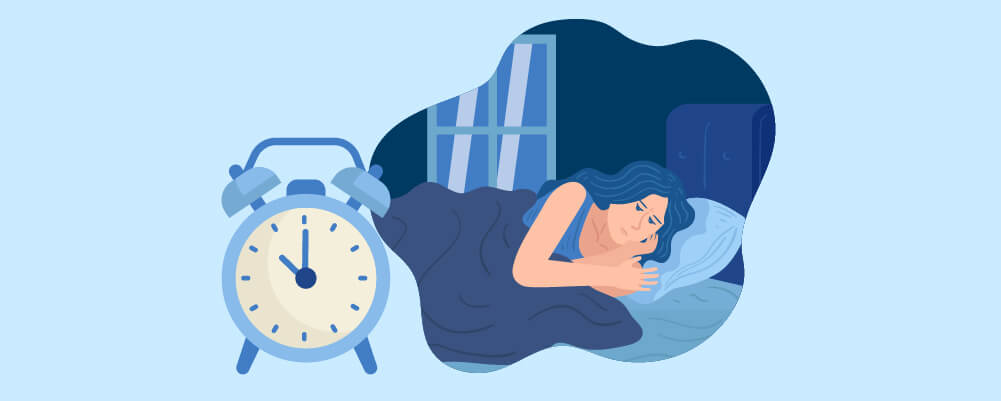
While you may not be able to control some factors that impact your sleep, you can incorporate positive habits into your routine that will encourage a better night’s rest. Start by implementing some (or all) of these key steps.
Stick To A Sleep Schedule
Sticking to a regular sleep schedule —yes, even on the weekend— will make it easier for your body to find its natural rhythm. This will enable you to fall asleep and wake up more quickly.
The best way to do this is to set aside no more than eight hours to achieve the sleep you need. The recommended nightly sleep for a healthy adult is at least seven hours and around 9 hours at most. However, most people don’t need more than eight hours in bed to achieve this goal!
Another helpful tip is getting into and out of bed around the same time each day. Try to limit alterations to your sleep schedule on weeknights and weekends to no more than an hour. Maintaining a consistent routine reinforces your body’s sleep-wake cycle.
If you don’t fall asleep within 20 minutes of getting into your bed, leave your bedroom and do something relaxing, such as reading a few chapters from your favorite book or listening to soothing music. Stay off your phone, as this could distract you from your end goal of falling asleep.
Then, head back to bed when your eyes are slowly beginning to close. Repeat as needed.
Pay Attention To What You Eat And Drink Throughout The Day And Before Bed
A balanced diet is a key to getting a fulfilling night’s sleep.
You must monitor your caffeine, excess sugar, and alcohol consumption throughout the day, significantly closer to bedtime. Caffeine is a stimulant that may take hours to wear off, and even though alcohol may make you sleepy, it can disrupt your sleep.
Before bed, avoiding foods that cause large spikes in blood glucose is best. These spikes can make you feel irritable, unsettled, or too hot while sleeping. Meanwhile, low blood sugar often causes nightmares and may make you feel clammy.
Food products that cause a spike — and then a drop — in blood sugar are those high in carbohydrates, quickly converted into energy. Rice, bread, fruits, and sugar are a few examples.
So, eating small amounts of foods like complex carbs, fruits, veggies, or a small amount of protein throughout the day will satiate hunger pains and help you fall asleep faster if you have to eat closer to bedtime.
You should never go to bed hungry or too full because discomfort might keep you up. This means you should stay away from heavy or large meals within a few hours of your bedtime. The best time to eat dinner is 3 hours before bed, allowing the stomach to properly digest and prepare for sleep.
Create A Restful Environment
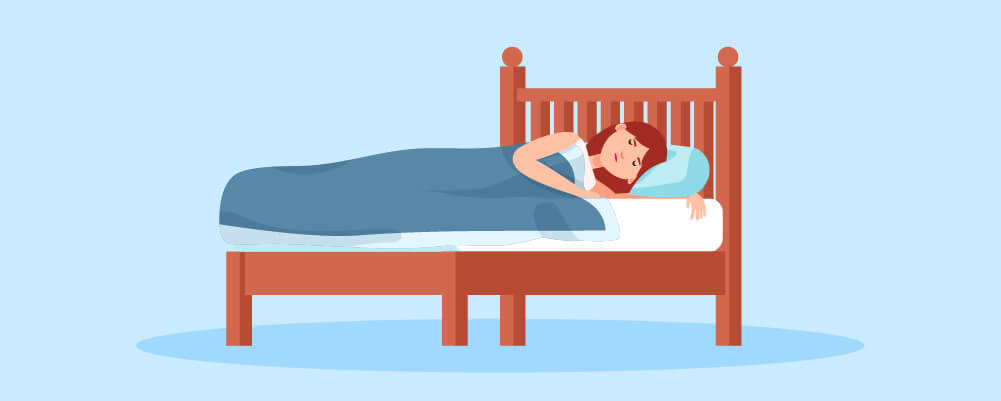
A relaxing environment is essential for a good night’s rest. Studies have shown people simply sleep much better when their bedroom is optimized for noise levels, temperature, comfort, and light.
The key is creating a room that is ideal for sleeping and relaxing. This means keeping your room darker, cooler, and much quieter – whether that’s concerning noise or light. Extreme exposure to light could make your environment a bit more uninviting. If this is the case, it might be far more challenging for you to fall asleep.
Consider using earplugs, room-darkening shades, a fan, or any other device that will enable you to create an environment designed to fulfill your needs. Another thing you can do to make a restful physical environment is avoid any prolonged use of screens just before you plan to go to bed.
You should also ensure that you make your bed before going to sleep. Knowing all you have to do is settle into your bed means you’ll be more likely to sleep well at night. A made bed also allows you to crawl into bed and fall asleep more quickly.
Adding a soothing fragrance to your room may make the space feel more restful. For example, try lavender oil or peppermint, which have been known to soothe and allow you to wake up feeling refreshed.
Calming activities before bedtime, such as taking a bath, low-impact stretching exercises, or watching an episode of your favorite TV show, might also promote better sleep.
Limit Day Time Naps
Napping can either be harmful or helpful, depending on several factors. This includes your age, the time of day you choose to nap, and why you are taking a nap. To get the most out of a nap, it’s essential to learn how each of these factors affects the impact of a nap.
Taking frequent daytime naps can significantly interfere with nighttime sleep. This is true for people of all ages. So if you choose to take a nap to relax and recharge or simply need to replenish your energy in this way, you should set yourself a limit. This will ensure that you do not spend too much time asleep.
You can do this by setting a timer for 20 to 30 minutes. Taking a longer nap can leave you feeling groggy (sleep inertia), and you are more likely to make mistakes and have accidents shortly after waking up. It’s also a good idea to avoid taking a nap late in the day if you can.
However, there are exceptions to this. For example, you may need essential naps if you are sick. These naps are often much longer than normal short bursts of rest because our bodies will require more rest to begin helping us to recover from an illness. If you work nights, you might also need to nap to catch up on sleep.
Include Physical Activity In Your Day
It’s no secret that working out has about a million benefits for your health. But did you know that better sleep is one of them? Regular physical activity can improve sleep quality and can also promote relaxation.
Whether you take the time to go for a stroll or two each day or do some strength training exercises, you will begin to improve your sleep quality by introducing regular exercise. The best part is that you can be flexible with the kind of exercise.
People who get at least 30 minutes of moderate aerobic exercise each day may even be able to see a difference in sleep quality that very same night.
Exercise can make you feel more energized throughout the day. This is thanks to the release of endorphins which trigger positive feelings in your body. If you are too tired to do any type of physical activity, a brisk walk can back up your energy levels!
However, you should take precautions so that exercise isn’t completed too close to bedtime. Otherwise, your body will feel far too energized for you to be able to settle down and relax.
If you find that working out at night isn’t helping you sleep, try exercising in the morning. Exercise works to raise your core body temperature, making you feel more awake.
Manage Your Worries

Attempting to resolve significant worries or concerns before bedtime is essential to having a good night’s sleep. Note down everything on your mind in a notebook or a journal to clear your mind, and then set it aside to worry about in the future.
Combatting the “what if” is an important way of managing your worries. While worrying about things protects us and enables us to prepare if something goes wrong, it also comes with lots of opportunities for overthinking.
Avoiding the “what if” process will enable you to think logically and eventually wind down your emotions at the end of each day – to the point where you will drift off to sleep completely worry-free.
Stress management might also help. Start with keeping yourself organized, delegating daily tasks, and prioritizing specific tasks. Meditation may also ease feelings of worry or anxiety.
The most important thing to do is set an artificial closure each day. This will be a deadline to end your working day and encourage the transition into sleep. This will establish a clear boundary between the day’s labor and might even optimize your sleep.
Know When To Contact Your Doctor
Nearly everyone has the occasional sleepless night. However, if you often have trouble drifting off to sleep at night, you might have a sleep disorder such as insomnia or sleep apnea.
Notably, any sleep disturbance could take a considerable toll on your mental and physical health and impact your overall quality of life. In addition, a long-term struggle with sleep could lead to negative emotions such as irritability, moodiness, depression, or anxiety.
These factors could cause significant problems in the workplace and the home environment. In this instance, you should contact your doctor as soon as possible.
Your doctor will give you a complete physical examination and inquire about your medical history, lifestyle habits, and symptoms to isolate the cause of your sleepless nights. They can also diagnose whether you suffer from more prominent issues, including sleep disorders.
If this is the case, your doctor may prescribe sleeping pills to help you. More importantly, identifying and treating any underlying causes can help you get the better sleep you deserve.
Summary
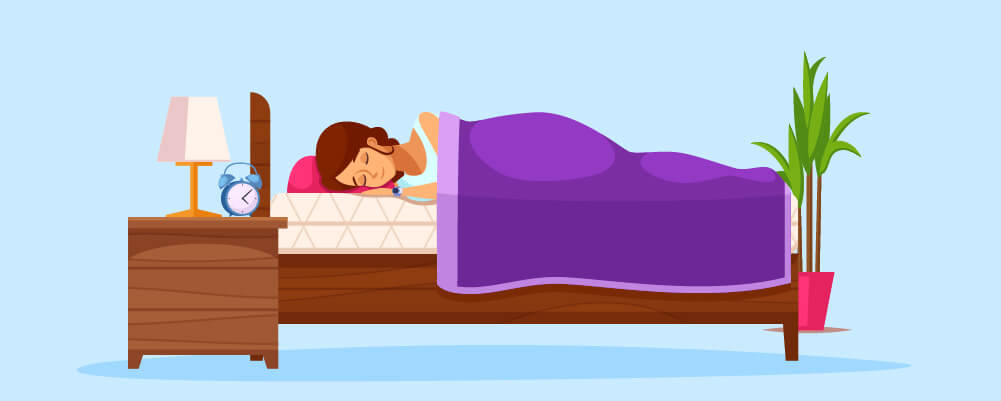
Taking the time to understand and, better yet, evaluate why you can’t achieve a fulfilling sleep is critical. You could be doing many things in your day-to-day life that impact your sleep, such as consuming too much caffeine, eating the wrong food, or even exercising at the worst possible time.
Lifestyle factors can be easily rectified to give you the best chance at a restful night. However, if you struggle with any type of mental or physical health disorder, you should consult your doctor so they can give you the help that you need.
- Unveiling the Magic: The Ultimate Guide to Sleep Tinctures - November 1, 2023
- Can You Sleep Standing Up? - October 31, 2023
- Taurine for Sleep: Your Natural Ticket to Tranquil Nights - October 10, 2023
This site contains affiliate links to products. We will receive a commission for purchases made through these links.

